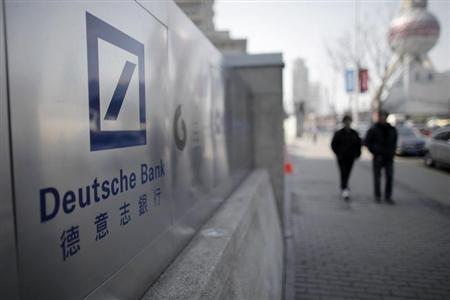

|
 |
|
A Deutsche Bank sign is seen outside of a corporate building in Shanghai's financial district February 23, 2011.[Photo/Agencies] |
New York - Foreign investors looking to access China's onshore market will have a new avenue starting on Wednesday when Deutsche Asset & Wealth Management launches the first ETF targeting direct exposure to shares of companies incorporated in the Chinese mainland.
The db X-trackers Harvest CSI 300 China A-Shares Fund, set to trade under the ticker "ASHR" on the NYSE Arca, will be the first ETF to directly tap into the "A-shares" market of domestic Chinese stocks priced in yuan and traded on the giant stock markets in Shanghai and Shenzhen.
Other ETFs have provided exposure to the A-shares market through derivatives, not shares. The Market Vectors China ETF, for example, invests in swaps linked to A-shares.
"The China A shares market is one of the few remaining major markets that is still somewhat untapped by most global investors because access to them has been restricted," said Dennis Hudachek, a senior ETF analyst at IndexUniverse, referring to
Chinese regulators require foreigners to apply for status as qualified investors, or Renminbi Qualified Foreign Institutional Investor (QFII or RQFII) status, and decide how much they can invest by issuing quotas. Recently, regulators in Beijing have expanded the number of foreign investors allowed to buy A-shares. "Transacting in China logistically is more complicated than in the US," Alex Depetris, chief operating officer of the Deutsche's exchange-traded products business in the Americas, said in an interview. Deutsche has partnered with Harvest Global Investments Limited, which is a RQFII, and a unit of Harvest Fund Management Co Ltd, the second-largest asset management company in China. "That really enabled us to develop this product as soon as the RQFII regime started being offered to ETF providers like us," Depetris said. ETF watchers will be looking to see if the fund's RQFII quota level is able to accommodate investor demand, which Hudachek said will be the real test. Asset managers receive quotas for a certain amount of investment. Once that is used, a manager would have to apply for a new quota. That could pose a problem for an ETF, which must buy more assets as investor money comes in. Depetris said they plan to closely monitor quota levels to put in for an increased quota should investor demand necessitate a higher level. If the new ETF is able to accommodate investor demand, then the fund "could be a total game changer," Hudachek said. "There's a lot of money expected to flow into A-shares in the coming years."